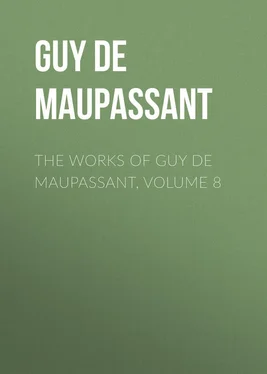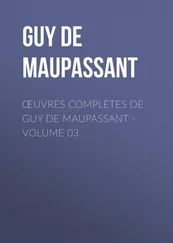Guy Maupassant - The Works of Guy de Maupassant, Volume 8
Здесь есть возможность читать онлайн «Guy Maupassant - The Works of Guy de Maupassant, Volume 8» — ознакомительный отрывок электронной книги совершенно бесплатно, а после прочтения отрывка купить полную версию. В некоторых случаях можно слушать аудио, скачать через торрент в формате fb2 и присутствует краткое содержание. Жанр: literature_19, foreign_antique, foreign_prose, на английском языке. Описание произведения, (предисловие) а так же отзывы посетителей доступны на портале библиотеки ЛибКат.
- Название:The Works of Guy de Maupassant, Volume 8
- Автор:
- Жанр:
- Год:неизвестен
- ISBN:нет данных
- Рейтинг книги:4 / 5. Голосов: 1
-
Избранное:Добавить в избранное
- Отзывы:
-
Ваша оценка:
- 80
- 1
- 2
- 3
- 4
- 5
The Works of Guy de Maupassant, Volume 8: краткое содержание, описание и аннотация
Предлагаем к чтению аннотацию, описание, краткое содержание или предисловие (зависит от того, что написал сам автор книги «The Works of Guy de Maupassant, Volume 8»). Если вы не нашли необходимую информацию о книге — напишите в комментариях, мы постараемся отыскать её.
The Works of Guy de Maupassant, Volume 8 — читать онлайн ознакомительный отрывок
Ниже представлен текст книги, разбитый по страницам. Система сохранения места последней прочитанной страницы, позволяет с удобством читать онлайн бесплатно книгу «The Works of Guy de Maupassant, Volume 8», без необходимости каждый раз заново искать на чём Вы остановились. Поставьте закладку, и сможете в любой момент перейти на страницу, на которой закончили чтение.
Интервал:
Закладка:
Mme. Roland, sunk in a deep chair, seemed lost in reminiscences once more. She murmured, as though she were thinking aloud:
"Ah, he was a good friend, very devoted, very faithful, a rare soul in these days."
Jean got up.
"I shall go out for a little walk," he said.
His father was surprised and tried to keep him; they had much to talk about, plans to be made, decisions to be formed. But the young man insisted, declaring that he had an engagement. Besides, there would be time for settling everything before he came into possession of his inheritance. So he went away, for he wished to be alone to reflect. Pierre, on his part, said that he too was going out, and after a few minutes followed his brother.
As soon as he was alone with his wife, father Roland took her in his arms, kissed her a dozen times on each cheek, and replying to a reproach she had often brought against him, said:
"You see, my dearest, it would have been of no good to stay any longer in Paris and work for the children till I dropped, instead of coming here to recruit my health, since fortune drops on us from the skies."
She was quite serious.
"It drops from the skies on Jean," she said. "But Pierre?"
"Pierre? But he is a doctor; he will make plenty of money; besides, his brother will surely do something for him."
"No, he would not take it. Besides, this legacy is for Jean, only for Jean. Pierre will find himself at a great disadvantage."
The old fellow seemed perplexed: "Well, then, we will leave him rather more in our will."
"No; that again would not be quite just."
"Drat it all!" he exclaimed. "What do you want me to do in the matter? You always hit on a whole heap of disagreeable ideas. You must spoil all my pleasures. Well, I am going to bed. Good-night. All the same, I call it good luck, jolly good luck!"
And he went off, delighted in spite of everything, and without a word of regret for the friend so generous in his death.
Mme. Roland sat thinking again, in front of the lamp which was burning out.
CHAPTER II
As soon as he got out, Pierre made his way to the Rue de Paris, the high-street of Havre, brightly lighted up, lively and noisy. The rather sharp air of the seacoast kissed his face, and he walked slowly, his stick under his arm and his hands behind his back. He was ill at ease, oppressed, out of heart, as one is after hearing unpleasant tidings. He was not distressed by any definite thought, and he would have been puzzled to account, on the spur of the moment, for this dejection of spirit and heaviness of limb. He was hurt somewhere, without knowing where; somewhere within him there was a pin-point of pain – one of these almost imperceptible wounds which we cannot lay a finger on, but which incommode us, tire us, depress us, irritate us – a slight and occult pang, as it were a small seed of distress.
When he reached the square in front of the theater, he was attracted by the lights in the Café Tortoni, and slowly bent his steps to the dazzling façade; but just as he was going in he reflected that he would meet friends there and acquaintances – people he would be obliged to talk to; and fierce repugnance surged up in him for this commonplace good-fellowship over coffee cups and liqueur glasses. So, retracing his steps, he went back to the high-street leading to the harbor.
"Where shall I go?" he asked himself, trying to think of a spot he liked which would agree with his frame of mind. He could not think of one, for being alone made him feel fractious, yet he could not bear to meet any one. As he came out on the Grand Quay he hesitated once more; then he turned toward the pier; he had chosen solitude.
Going close by a bench on the breakwater he sat down, tired already of walking and out of humor with his stroll before he had taken it.
He said to himself: "What is the matter with me this evening?" And he began to search in his memory for what vexation had crossed him, as we question a sick man to discover the cause of his fever.
His mind was at once irritable and sober; he got excited, then he reasoned, approving or blaming his impulses; but in time primitive nature at last proved the stronger; the sensitive man always had the upper hand over the intellectual man. So he tried to discover what had induced this irascible mood, this craving to be moving without wanting anything, this desire to meet some one for the sake of differing from him, and at the same time this aversion for the people he might see and the things they might say to him.
And then he put the question to himself, "Can it be Jean's inheritance?"
Yes, it was certainly possible. When the lawyer had announced the news he had felt his heart beat a little faster. For, indeed, one is not always master of one's self; there are sudden and pertinacious emotions against which a man struggles in vain.
He fell into meditation on the physiological problem of the impression produced on the instinctive element in man, and giving rise to a current of painful or pleasurable sensations diametrically opposed to those which the thinking man desires, aims at, and regards as right and wholesome, when he has risen superior to himself by the cultivation of his intellect. He tried to picture to himself the frame of mind of a son who has inherited a vast fortune, and who, thanks to that wealth, may now know many long-wished-for delights which the avarice of his father had prohibited – a father, nevertheless, beloved and regretted.
He got up and walked on to the end of the pier. He felt better, and glad to have understood, to have detected himself, to have unmasked the other which lurks in us.
"Then I was jealous of Jean," thought he. "That is really vilely mean. And I am sure of it now, for the first idea which came into my head was that he would marry Madame Rosémilly. And yet I am not in love myself with that priggish little goose, who is just the woman to disgust a man with good sense and good conduct. So it is the most gratuitous jealousy, the very essence of jealousy, which is merely because it is! I must keep an eye on that!"
By this time he was in front of the flagstaff, whence the depth of water in the harbor is signaled, and he struck a match to read the list of vessels signaled in the roadstead and coming in with the next high tide. Ships were due from Brazil, from La Plata, from Chili and Japan, two Danish brigs, a Norwegian schooner, and a Turkish steamship – which startled Pierre as much as if it had read a Swiss steamship; and in a whimsical vision he pictured a great vessel crowded with men in turbans climbing the shrouds in loose trousers.
"How absurd," thought he. "But the Turks are a maritime people, too."
A few steps further on he stopped again, looking out at the roads. On the right, above Sainte-Adresse, the two electric lights of Cape la Hève, like monstrous twin Cyclops, shot their long and powerful beams across the sea. Starting from two neighboring centers, the two parallel shafts of light, like the colossal tails of two comets, fell in a straight and endless slope from the top of the cliff to the uttermost horizon. Then, on the two piers, two more lights, the children of these giants, marked the entrance to the harbor; and far away on the other side of the Seine others were in sight, many others, steady or winking, flashing or revolving, opening and shutting like eyes – the eyes of the ports – yellow, red, and green, watching the night-wrapped sea covered with ships; the living eyes of the hospitable shore saying, merely by the mechanical and regular movement of their eyelids: "I am here. I am Trouville; I am Honfleur; I am the Audemer River." And high above all the rest, so high that from this distance it might be taken for a planet, the airy light-house of Etouville showed the way to Rouen across the sand banks at the mouth of the great river.
Читать дальшеИнтервал:
Закладка:
Похожие книги на «The Works of Guy de Maupassant, Volume 8»
Представляем Вашему вниманию похожие книги на «The Works of Guy de Maupassant, Volume 8» списком для выбора. Мы отобрали схожую по названию и смыслу литературу в надежде предоставить читателям больше вариантов отыскать новые, интересные, ещё непрочитанные произведения.
Обсуждение, отзывы о книге «The Works of Guy de Maupassant, Volume 8» и просто собственные мнения читателей. Оставьте ваши комментарии, напишите, что Вы думаете о произведении, его смысле или главных героях. Укажите что конкретно понравилось, а что нет, и почему Вы так считаете.












